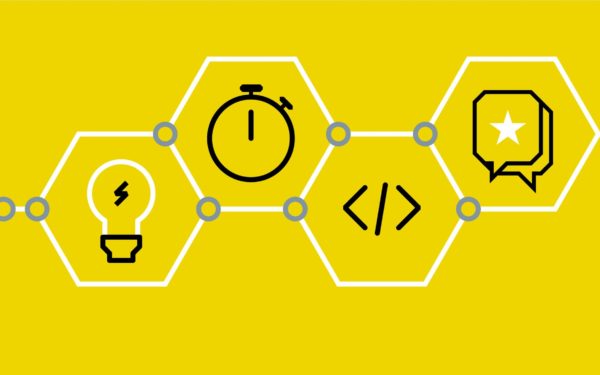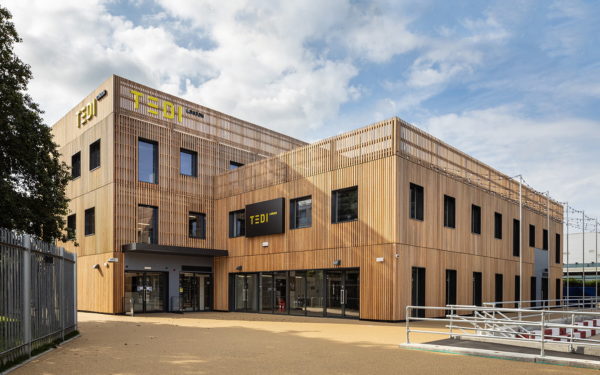
BEng (Hons)
Engineering with Mechatronics Systems
COMING SEPTEMBER 2026
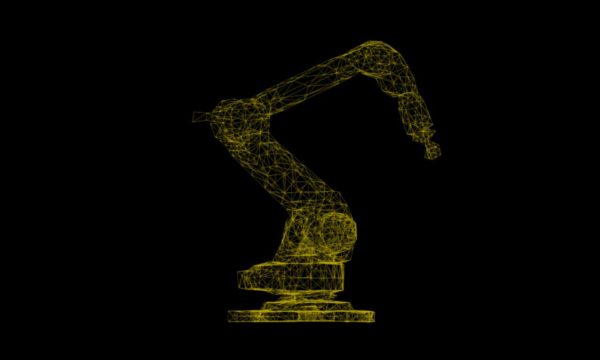
Engineer tomorrow, today.
Engineering with Mechatronics Systems combines mechanical, electrical, computer systems and digital innovation at the forefront of Industry 4.0. Designed for a sustainable future, this future-focused degree blends robotics, AI, smart systems, and eco-conscious design to equip you for the next generation of engineering challenges. Get hands-on with cutting-edge tech and shape a smarter, greener world.
Overview

70% Engineering 30% Mechatronics Systems. 100% Futureproof.
Curious about the tech that powers robotics, smart factories, and intelligent machines? This course is your launchpad. Engineering with Mechatronic Systems gives you the skills to design, build and optimise the smart, sustainable systems of the future — blending mechanics, electronics, computing, and control into powerful real-world solutions.
You won’t just learn the theory — you’ll do the doing. From automation and robotics to the Internet of Things, cybersecurity, and intelligent control systems, you’ll dive deep into the technologies shaping Industry 4.0. Along the way, you’ll explore how to design for sustainability, manage supply chains, and drive innovation from concept through to creation.
We emphasise sustainability and global responsibility, encouraging you to be socially responsible and inclusive engineers who act as trusted agents of public good.
Graduates are well-prepared to apply their theoretical and practical knowledge innovatively in real-world scenarios, making positive impacts in organisational developments.
You’ll gain a forward-looking education that aligns with the principles of Engineers 2030, preparing them to be socially responsible and inclusive engineers.
Course content
In your first year you’ll build a solid foundation in core engineering principles. As you learn more about Industry 4.0 you’ll be able to apply this learning to analytically solve engineering problems with a fresh technological perspective.
TEDI-London’s practical, project-based pedagogy is at the core of the programme’s design, with each module developed through an industry-focused, project-based mindset. This approach ensures that you are not only learning theoretical concepts but also applying them in real-world scenarios.
You’ll start your journey as a student engineer learning professional skills that are essential to becoming an effective engineer.
-
Get ready to take control (literally) as you explore the world of smart systems. Learn how sensors, actuators, and control systems work together to bring machines and devices to life. Analyse how machines sense, react, and make decisions. Design and simulate control systems, the kind that keep robots balanced, cars on course, and industrial systems running smoothly.
Using industry software such as MATLAB/Simulink and microcontroller platform (e.g. Arduino), you’ll build simulations, analyse system responses, and design control strategies. Through structured coding exercises and practical workshops, you’ll get comfortable working with feedback systems, transfer functions, and system stability.
By the end, you’ll be able to model dynamic systems, design and test controllers, and understand the role of sensors and actuators in smart, automated solutions. It’s a practical, project-based experience built around real tools and real challenges.
-
You’ll start by building up your fundamental skills of dynamics, and develop your proficiency in modelling and simulation, along with your programming skills. No need to be an expert - we’ll help you get comfortable using programming tools like MATLAB to create smart, effective solutions. Exploring how motion, forces, and energy interact in physical systems, and how to simulate all of that with code.
You’ll work in a team to take on a real-life engineering scenario. Together, you’ll design, build, and present a working simulation, explaining your approach and showing off the code behind it.
By the end, you’ll be able to think like an engineer, build digital models of physical systems, and make decisions based on real life data. You won’t just understand the theory, you’ll put it into action. It’s hands-on, fast-moving, and focused on the kind of skills you’ll use in your future career.
-
You’ll be solving problems, designing products, and making big decisions as part of a team.
You’ll dig into the fundamentals of solid mechanics, materials science, and manufacturing but you won’t just study them. You’ll use them. You’ll choose materials, model your design with Computer Aided Design (CAD) software, run stress tests, and figure out how to make it - all while thinking about quality, cost, flexibility, safety, ethics, and sustainability.
Along the way, you’ll build serious skills in CAD, stress analysis, and design thinking. Get better at presenting ideas, working with others, and backing up your decisions with solid reasoning. Expect to be challenged, to inspire others, supported, and maybe even surprised by what you can create, break or make.
It’s fast-paced, practical, and packed with the kind of experience that makes you stand out. This is engineering the way it should be, hands-on, real-world, and all about bringing your ideas to life.
-
Undertaking a design challenge, you’ll demonstrate your leadership and impact in engineering. Working on a real-life global challenge, underpinned by the UN Sustainability Goals, you’ll cover environmental, ethical, commercial, social, governance and cultural aspects of engineering.
Reflecting on your strengths and contributions, you’ll develop your teamwork, research, communication and problem-solving skills. These key skills are important for developing your professionalism as an engineer.
In the second year of study your focus will shift from engineering fundamentals to mechatronics systems principles and their applications.
You’ll continue to build on the engineering fundamentals and professional skills developed in the first year of study.
-
If you're building the future, you need to know how to protect it. You’ll explore cyber incidents and threats, digital defences, and secure system design — all through the lens of modern engineering and AI.
You’ll learn how attackers think, what makes systems vulnerable, and how to build security in from the basics. Using professional tools, you’ll investigate real-world threats and secure AI-integrated systems.
Through hands-on exercises, simulations, and projects, you’ll analyse attacks and create systems that can stand up to them. Alongside the technical work, you’ll tackle the ethical and legal challenges that come with protecting data and people.
It’s about more than just code - it’s about making smart systems safe for the real world.
-
Understand how engineering systems communicate is crucial to unleashing the power of AI. You’ll dive into the essentials of networking: protocols, architecture, data transmission, and wireless systems.
You’ll build and test communication setups that support smart technologies like sensor networks and automated systems. Using appropriate tools, you’ll simulate networks, trace data flow, and troubleshoot real-world issues.
You’ll also examine how to secure, scale, and optimise these systems, while tackling the ethical and legal challenges of connected technologies.
This is about building the invisible systems that keep intelligent technologies running and making sure they run right.
-
Ready to turn messy data into smart decisions? Here, you’ll take on the role of a data detective diving into real industrial data to uncover insights, spot patterns, and build intelligent tools that work.
You’ll get to grips with cleaning and shaping raw data so it tells a clear visual story. Then you’ll explore machine learning in action — training models, testing outcomes, and figuring out how systems can learn and improve. It’s all about building practical skills through hands-on tasks and real-world case studies.
You'll explore the full spectrum of machine learning, from visualising complex data with tools like heatmaps and correlation plots, to training intelligent algorithms that learn from data, recognise patterns, and predict future behaviour with real-world impact. And it’s not just about the tech — you’ll also tackle the big questions around ethics, sustainability, bias, and data privacy. Just because a system can make an informed decision, doesn’t mean it should.
By the end, you’ll be able to take an industrial dataset, turn it into a story, and pitch your findings with clarity and confidence. You'll also learn from the past using real examples of where AI failed - analysing what went wrong, and how it could've been avoided.
It’s fast-paced, relevant, and right at the intersection of data, technology, and impact.
-
Ecological Structures gives you an opportunity to work like a professional engineer, analysing, testing, and pitching solutions to a real-world challenge. You’ll take on the role of a consultancy team, tackling a project brief that pulls together structural analysis, thermodynamics, and environmental impact. Think things like Electric Vehicle (EV) chassis design or modular building systems - the technology that shapes tomorrow’s world.
You’ll get hands-on with advanced tools like finite element analysis (FEA) to test how your structure performs under stress and explore how heat flows through your design. Then you’ll dig deep into the sustainability side, using Life Cycle Assessment to weigh up the impact of your materials and choices from start to finish.
This isn’t just about getting the maths right — though you’ll do that too. It’s about thinking smart, solving complex problems, and finding ways to make your design adaptable, efficient, effective, and environmentally responsible. Every week you’ll build your skills through focused sessions and use them straight away on your project. It’s collaborative, technical, and built to give you the experience that matters.
-
This is where your ideas meet action. You’ll immerse yourself in a team project with a real-world brief designing a product, system, or process that solves a genuine challenge. It’s not just about what you build it’s how you plan, research, test, and deliver something that works.
You’ll dig into how research fuels innovation. That means learning how to ask the right questions, gather evidence, and build a strong case for your solution. You'll plan your project, manage change, deal with setbacks, and learn how to keep things moving when everything gets messy, just like in real engineering.
Every decision you make will need backing whether it’s technical, ethical, environmental or commercial. You’ll use design thinking, experiment with prototypes, and learn how to turn a great concept into something real. Alongside your team project, you’ll also develop your own proposal for a new idea that could be taken to market. It’s your chance to explore what matters to you and how you’d bring it to life.
You’ll come away with experience in research, leadership, business modelling, and creative problem-solving. By the end, you won’t just be talking about innovation, you’ll be driving it.
In the final year of study, the focus will be on advanced mechatronics systems topics, building on those introduced in the previous year’s study such as robotics, digital manufacturing, industrial internet of things and smart factories.
The programme will culminate with a significant individual industry related project. Allowing you to demonstrate your learning through investigation and evaluation of a real-world industrial problems.
-
Step into the future of manufacturing. Design and evaluate intelligent factory systems that use AI, data analytics, and real-time monitoring to boost productivity, quality and sustainability.
You’ll explore cutting-edge technologies like the Industrial Internet of Things (IIoT), cyber-physical systems, machine learning, smart sensors and digital twins and build solutions that adapt, learn, and optimise in real time.
This is all about building responsive, data-driven factories that can think for themselves and making sure they’re safe, efficient and future-ready.
-
Design and build intelligent systems that connect devices, networks, and data in real time to transform industrial processes. You'll explore how the Industrial Internet of Things (IIoT) is used in smart factories, robotics, and automation — integrating sensors, actuators, and AI to create scalable, secure, and efficient solutions.
You'll cover essential topics like edge and cloud computing, data acquisition, digital twins, communication protocols, and cybersecurity. Using hardware and software, you’ll develop IIoT systems capable of real-time monitoring, predictive maintenance, and adaptive control.
Giving you the skills to deliver smart, connected systems that improve performance and decision-making all while tackling the ethical and societal questions that come with deploying large-scale digital infrastructure.
-
You’ll learn how to design and implement advanced manufacturing systems using the latest digital tools. You’ll explore how CAD/CAM integration, additive manufacturing, simulation and digital twins come together to create smarter, more efficient production processes.
You’ll use digital tools to develop solutions that support real-time monitoring, predictive maintenance, and data-driven optimisation. The focus is on building systems that are adaptable, scalable, and aligned with Industry 4.0 standards.
This is about using technology to improve how things are made, faster, cleaner, smarter.
-
Develop the tools to build intelligent systems that control, communicate and adapt in real time. You’ll explore how embedded systems and distributed networks power smart manufacturing, automation, robotics and IoT.
You’ll work with microcontrollers, real-time operating systems, and edge computing, using platforms like Arduino and Raspberry Pi. From interfacing sensors to integrating AI for improved performance and autonomy, you'll learn how to create responsive, scalable and efficient systems.
Preparing you to engineer the brains and networks behind tomorrow’s smart technologies, responsibly and effectively.
-
Equipping you to design, control, and evaluate intelligent robotic systems for real-world engineering applications. You’ll work with core robotics principles like kinematics, dynamics, control systems, and motion planning then apply AI techniques to boost perception, decision-making and autonomy.
You’ll use digital tools to build and simulate robotic systems that can move, sense, adapt, and interact. From industrial arms to mobile robots, you’ll learn to design machines that work efficiently, safely and intelligently in dynamic environments.
This is about building the next generation of robotic systems, smart, adaptable, and ready for Industry 4.0.
-
This is your chance to take the lead. You’ll design, manage, and deliver a project of your own something rooted in your degree, relevant to industry, and shaped by your interests.
You’ll be in charge from start to finish defining the problem, planning your approach, applying technical skills, and producing a full written report. It’s a deep dive into real engineering work guided by a supervisor but driven by you.
Expect to develop skills in everything from research, planning, development to hands-on technical skills depending on your project. You’ll meet with your supervisor at key checkpoints to review progress, get feedback, and make sure your project stays on track.
Culminating with a final report and a viva, where you’ll present your work and defend your decisions. Along the way, you’ll build serious skills in project management, evaluation, communication, and independent problem-solving, all documented in your portfolio.
It’s your final-year project and your biggest opportunity to show what you’re capable of.
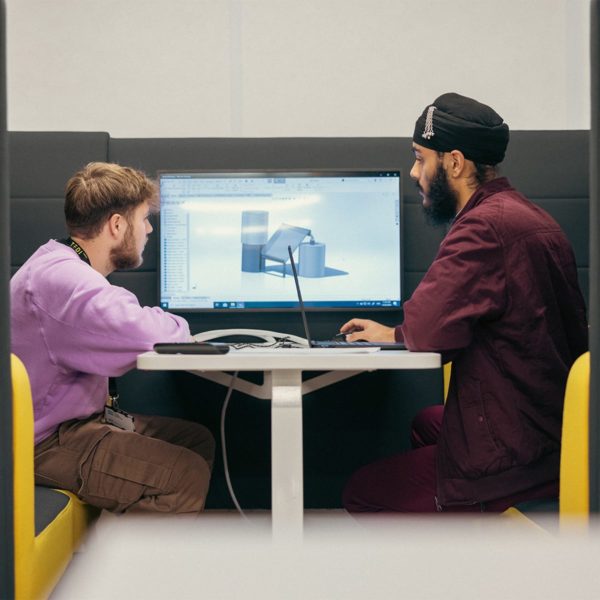
How will I learn?
You’ll experience an unconventional and flexible learning approach. We focus on practical, project-based learning without traditional lectures.
TEDI-London’s campus at Canada Water in London features purpose-built Makerspaces designed to foster creativity and collaboration. These spaces are equipped with everything needed for hands-on learning, from small prototyping and 3D printing to large-scale equipment. The Makerspaces are integral to the project-based learning approach at TEDI-London, allowing you to develop your ideas and grow your engineering skills. Our Makerspaces boast milling machines, 3D printers, CNC machines, IoT sensors, and Smart Wearables to create and enhance seamless, efficient, flexible and responsive manufacturing environment known as Industry 4.0.
TEDI-London’s approach to learning is highly practical and project-based. Students are treated as professionals in training and will work on real-life challenges co-designed and co-delivered with employers. This hands-on approach ensures that you gain practical experience from day one, making you well-prepared for placements and future careers in engineering.
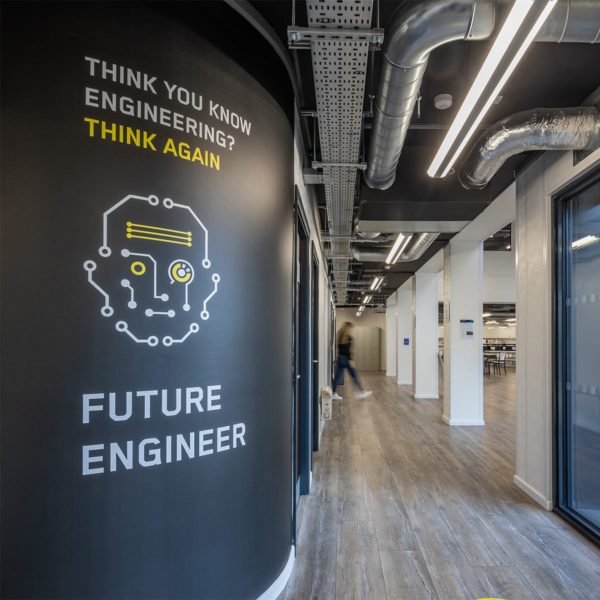
Assessment method
To ensure you are progressing, we use a range of assessments designed to evaluate your practical and theoretical understanding. The assessment approach is inclusive, appropriate and effective in enabling you to develop your abilities, pass modules, and be successful in the programme.
Typical assessment methods at TEDI-London include a mixture of group project reports, individual reports, pitches, presentations, demonstrations, short videos, portfolio development and posters. This diverse range of assessment methods ensures that you demonstrate your understanding and skills in multiple ways, catering to different learning styles and preferences.
Working with industry
Collaboration with industry throughout your studies is core to the TEDI-London experience. The programme is designed to be industry-focused, ensuring that you are not only learning theoretical concepts but also applying them in real-world scenarios. Though specific industry partners identification is on-going, the programme will involve co-designing with industry to ensure that the curriculum is aligned with real-world needs and challenges.
TEDI-London emphasises regular industry interaction as part of its project-based learning approach. Students will engage with industry experts in a professional capacity from the very start of their programme. This includes meeting industry professionals during projects and masterclasses, which allows students to build their professional networks and gain insights into various sectors. Many projects will involve working in small teams to deliver solutions to real client partners, managing the project from end-to-end, including research, design ideation, prototyping, and presenting the solution.
This hands-on approach ensures that students gain practical experience and develop vital skills like collaboration, communication, project management, and commercial awareness, making you well-prepared for the workplace.
Entry requirements
The following criteria is intended as a guide to help you gauge if TEDI-London is for you:
- If studying A Levels, IB, BTEC (or any post 16 education) you’ll be on track for approximately 112-120 UCAS points or equivalent
- GCSE Maths grade C/4 (or equivalent Level 2 qualification)
- You may be invited to an online interview
No Maths A-Level? No problem
We are not saying maths isn’t important to study engineering – it is! However, we don’t see a Maths Level 3 qualification as essential to studying with us and becoming an incredible future engineer. Alongside all the other engineering skills that you’ll develop, we’ll support you throughout your maths journey with us, and it’ll become yet another tool to help you change the world for the better.
After you graduate

Graduates will be well prepared with a strong blend of core engineering principles and mechatronics systems skills, making them highly sought after in various industries. You’ll have the opportunity to pursue a range of job titles and further study options.
Potential careers available to graduates:
- Mechatronics Systems Engineer
- Digital Manufacturing Engineer
- Manufacturing Systems Engineer
- Automation Engineer
- Technical Project Manager
- Production Manager
- Industrial Engineer
- Business Development Engineer
- Quality Control Manager
- Supply Chain Manager
- Process Manager
- Systems Engineer
- Robotics Engineer
- Field Service Engineer
Graduates may choose to further their education by pursuing advanced degrees such as a master’s or PhD in related fields. They can also consider specialised certifications or professional development courses to enhance their expertise in specific areas of Mechatronics Systems and Engineering.
If global experience and a master’s is up your street, head to Arizona State University to study a Master of Science at the Ira A. Fulton Schools of Engineering.



